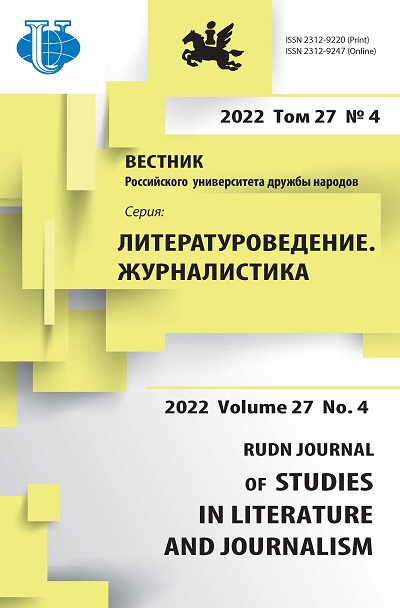Analysis of Russian and global game studies: ludology vs. narratology
- Authors: Pugachev A.A.1
-
Affiliations:
- Peoples’ Friendship University of Russia (RUDN University)
- Issue: Vol 27, No 4 (2022)
- Pages: 823-832
- Section: JOURNALISM
- URL: https://journals.rudn.ru/literary-criticism/article/view/33292
- DOI: https://doi.org/10.22363/2312-9220-2022-27-4-823-832
- ID: 33292
Cite item
Full Text
Abstract
The author reviews the past-to-present academic literature on game studies from the perspective of ludology and narratology. The academic study of video games has grown substantially since 2001 - the year Game Studies started publishing its first articles. Yet both ludology and narratology remain a particularly new field, especially in the Russian academic field, and many of its discussed themes have yet to attain widespread recognition. The academic articles published between 2017 and 2022 were reviewed to provide understanding of the current state of the research on ludology and narratology in various research areas. The corpus was gathered by searching publications in international database Scopus. Each article was categorized according to the type of database, period of time, the country of publication, the field of study and the frequency of citations. The applied method of quantitative research allows tracking the development of research within five years in the field of game studies. Several proposals for further research in this field were put forward. The main hypothesis of this work is that one type of methodology is more applicable than the other, considering the background. The author concludes that one type of methodology can prevail in research - depending on the region of the published article.
Keywords
About the authors
Andrei A. Pugachev
Peoples’ Friendship University of Russia (RUDN University)
Author for correspondence.
Email: quadriptych@gmail.com
ORCID iD: 0000-0001-6722-2431
PhD scholar, Department of Mass Communication, Philological Faculty
10 Miklukho-Maklaya St, bldg 2, Moscow, 117198, Russian FederationReferences
- Aarseth, Espen J. Norwegia - 2001. Computer Game Studies, Year One. Game Studies. Retrieved August 15, 2022, from http://gamestudies.org/0101/editorial.html
- Ahmed, I., Imran, M., Ramayah, T., Osama, A., & Nasser, A. (2017). Extending the theory of planned behavior (TPB) to explain online game playing among Malaysian undergraduate students. Telematics and Informatics, 34(4), 239-251. http://doi.org/10.1016/j.tele.2016.07.001
- Drew, D. (2022). Know thy gamer: A parent’s guide to video games. B&H Publishing Group.
- Frasca, G. (2003). Ludologists love stories too: Notes from a debate that never took place. Proceedings of the 2003 DiGRA International Conference: Level Up (vol. 2). Retrieved August 15, 2022, from http://www.digra.org/digital-library/publications/ludologists-love-stories-too-notes-from-a-debate-that-never-took-place/
- Frasca, G. (2003). Simulation versus narrative: Introduction to ludology. In M.J.P. Wolf & B. Perron (Eds.), The Video Game Theory Reader (pp. 221-235). Routledge.
- Juul, J. (2001). Game telling stories? A brief note on game and narratives. Game Studies, 1(1). Retrieved August 15, 2022, from http://gamestudies.org/0101/juul-gts/
- Kewin, W., Jana, A., Chris, A., Brooke, A., Jeff, L., & Kevin, D. (2022). 2022 Digital media trends. Toward the metaverse (16th ed.). Retrieved August 15, 2022, from https://www2.deloitte.com/us/en/insights/industry/technology/digital-media-trends-consumption-habits-survey/summary.html
- Krzywinska, T., & King, G. (2002). ScreenPlay: Cinema/videogames/interfaces. Wallflower Press.
- Mäyrä, F. (2008). An introduction to game studies: Games in culture. SAGE Publications Ltd. http://doi.org/10.4135/9781446214572
- Pina Arrabal, A. (2021). Videoludic discourse and transhumanism in SOMA. Artnodes, (28). http://10.7238/artnodes.v0i28.385626
- Rodríguez, S., Martín-Núñez, M., & Gil-Soldevila, S. (2017). Ludologic design and augmented reality. The game experience in Pokémon Go! (Niantic, 2016). Revista Latina de Comunicación Social, 72, 667-678. http://doi.org/10.4185/RLCS-2017-1185
- Vargas-Iglesias, J.J. (2020. Making sense of genre: The logic of video game genre organization. Games and Culture, 15(2),158-178. http://doi.org/10.1177/1555412017751803
- Vetushinskiy, A.S., & Salin, A.S. (2020). Game studies in Russia: Eight year. Sociology of Power, 32(3), 8-13. http://doi.org/10.22394/2074-0492-2020-3-8-13
Supplementary files















